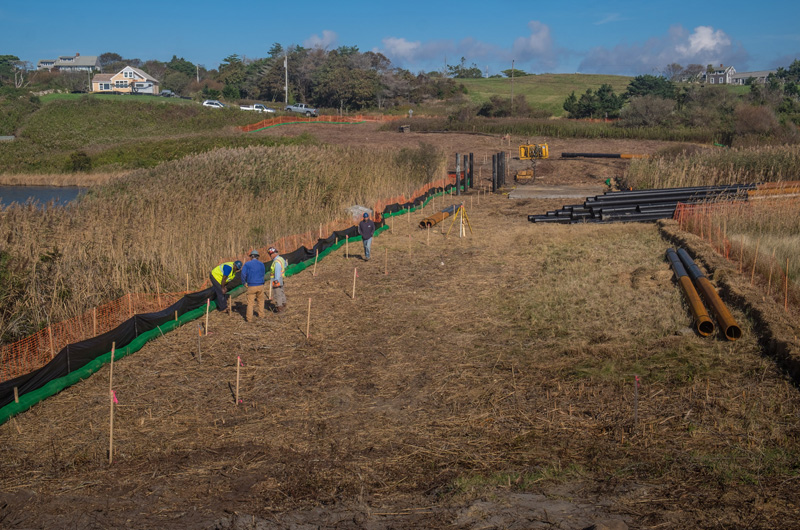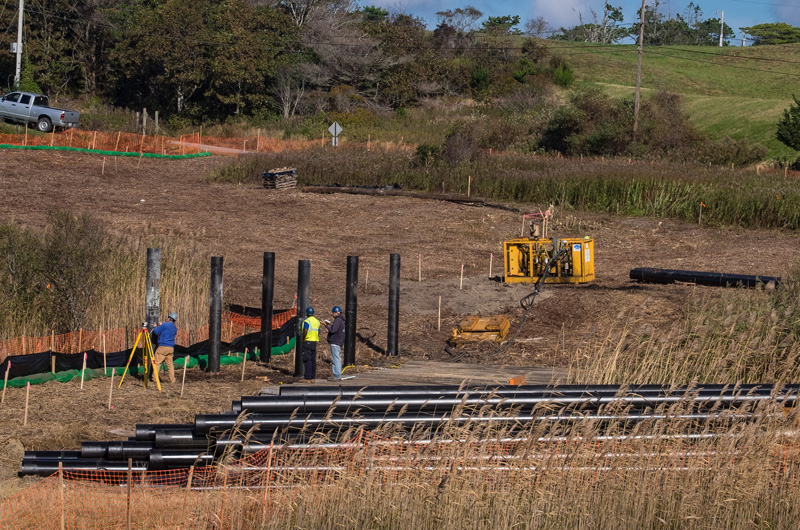A superior court judge has denied a request for a preliminary injunction to block the Squibnocket causeway project.
In strongly-worded ruling issued Friday, the Hon. Gary Nickerson disagreed with every claim in the complaint filed by 11 citizens, finding instead that the long-planned and much-debated raised causeway project will be a benefit to the town.
“The record at hand strongly suggests the project will result in great public benefit,” the judge wrote.
The citizen group had claimed that the defendants, Squibnocket Farm homeowners and contractor C. White Marine, had not obtained a Chapter 91 permit as required under state law, and that the project has also failed to obtain a signoff from the Chilmark planning board as required under the town subdivision rules.
On both counts, the judge disagreed, noting among other things “the extreme vetting this project has received.”
Arguments were heard Wednesday on the injunction request and the judge took a view of the property.
The decision means work can continue on the causeway project, where C. White Marine has been on the job for more than a week.
The causeway will provide access to the Squibnocket Farm subdivision, an enclave of high-end private homes, by relocating the current grade-level road which is eroded from recent storms.
In the lawsuit filed Oct. 13, the 11 plaintiffs claimed the project will cause irreparable harm to the environment within the historic high water mark of Squibnocket Pond and said the project should not go forward without a permit from the Massachusetts Department of Environmental Protection (MassDEP). They also claimed that the project involves relocation of a road to a subdivision, and needs an engineering plan approved by the Chilmark planning board.
In a separate but related action, another project opponent, Doug Liman, has asked the MassDEP to determine for itself whether it has jurisdiction over the section of land where the causeway is being built. MassDEP has set a deadline of Nov. 10 to receive written comments on that question, after which it has 60 days to issue a determination.
The 11 plaintiffs are Paul Hornblower, Zachary Lee, Chris Fischer, Greg Worley, Minah Worley, Thomas Bena, Will Sawyer, Rosalie Hornblower, Grace Barrie, Thomas Burns Jr. and Astrid Peterson Burns. A slightly different list of plaintiffs appears on court documents filed in support of the complaint. Officials at the superior court Friday said they were unable to explain the discrepancy.
The plaintiffs are represented by Island attorney Daniel Larkosh and Boston attorney Glen Wood.
Lead attorney Peter Alpert from the Boston law firm Ropes and Gray opposed the group’s motion for injunctive relief to stop work on the project. He referred to a series of legal and regulatory challenges over the past several years. “A small but vocal minority of in dividuals, including several plaintiffs, have done everything conceivable (and inconceivable) to block the project, all to no avail,” wrote the attorneys. “Proving the adage that desperate times call for desperate measures, plaintiffs have resorted to bringing two entirely frivolous claims.”
In its own opposition to the request for a preliminary injunction, C. White Marine said stopping the project would be expensive in terms of money and time, putting a $1.5 million price tag on the work.
An issue in the lawsuit was whether the project lies below the historic high water mark. The plaintiffs cite historic aerial photographs of Squibnocket Pond to support their contention that the project lies below the high water mark, which would require a MassDEP license under Chapter 91 of Massachusetts law.
Attorneys for Squibnocket Farm refuted the claim, and Judge Nickerson agreed.







Comments (7)
Comments
Comment policy »